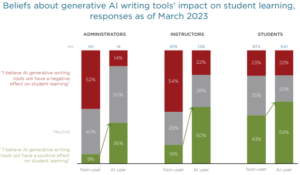With the proliferation of AI in higher education, one report makes it clear that as students run rampant with the technology, higher ed leaders fear its implications yet remain unsure of what to do.
“Time for Class 2023,” a joint report conducted by Tyton Partners and supported by Anthology and Turnitin, found that the top instructional challenge reported in spring 2023 is preventing students from cheating, up from 10th this time last year, before OpenAI sicced ChatGPT on the public in November.
Despite instructors’ worries, only 3% of institutions have developed a formal policy regarding the use of AI tools. Most (58%) intend to create one “soon.” However, what “soon” looks like on a timetable isn’t clear.
But data shows that policy won’t be enough; more than half of students (51%) say they “will continue to use generative AI tools even if their instructors or institutions prohibit it.”
“Students are less likely to abide by AI rules when a faculty member cannot—or does not—articulate the power of these technologies to do many of the tasks set in the course,” said Dr. Andy Pennock, co-chair of the University of Virginia’s Generative AI Teaching and Learning Taskforce, according to the report.
More from UB: Why a number of schools are opting to freeze tuition next year
Changing students’ AI behavior may start with changing your own
Firsthand use of generative AI changed administrators’ beliefs about its potential value and the need for regulation. Specifically, the rate of administrators who believed AI generative writing tools would positively affect student learning shot up by 24% among those who used it compared to those who didn’t. Similarly, those with negative views of generative AI fell by 38%, cutting disapproval down to 14%.

As for instructors, those versed in AI reported using it to generate prompts and assessments, make grading easier and teach students how to use generative AI tools effectively far more than instructors who aren’t.
“Instead of even thinking about it as cheating, we should encourage students to use these tools heavily, be open about how they’re doing it, and design assignments that leverage that rather than trying to ‘catch’ it,” said Ryan Baker, an educational data mining and learning analytics professor at UPenn.
The report makes it clear that instructors and administrators fear what they don’t know, and the best remedy is to dive into it. Almost half of students (48%) reported using generative AI at least once compared to 71% of instructors and administrators having never used it.
“You do not need to be an expert in AI models to experiment with their use as a teaching and learning tool. Instructors don’t need to know how a lightbulb works to turn on the lights in a classroom. Learning how to use AI tools via firsthand use is quick and easy,” said Balazs A. Szelenyi, director of faculty at Northeastern University.
Time for Class 2023 is informed by responses from over 2,000 students, 1,700 instructors, and 300 higher education administrators this past spring.



